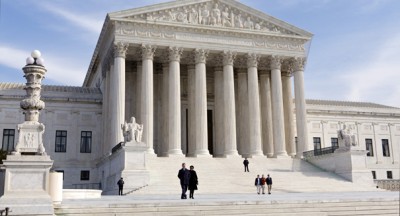
Image source: FoxNews
Could the same U.S. Supreme Court that has issued sweeping victories for gun rights actually issue a landmark ruling against concealed carry? At least one prominent UCLA professor seems to think so.
Six years ago the high court issued the landmark Second Amendment ruling guaranteeing the individual right to own a gun. Two years later the Supreme Court expanded on the ruling, again angering many in the gun control crowd. But this year, the court has gone out of its way to avoid any right-to-bear-arms cases, according to UCLA constitutional law professor Adam Winkler.
The Supreme Court’s ruling in District of Columbia v. Heller in 2008 left on the table whether the Second Amendment precludes a ban on guns not just inside a home but also in the street. The court’s decision in McDonald v. Chicago two years later expanded on the application of Heller outside Washington, but also left unaddressed the public-carry question.
The two gun rights decisions were heralded as a win by Second Amendment supporters, but left unanswered two very important questions, Winkler wrote: Is carrying a gun in public a right protected under the Second Amendment, and what legal test should be used to determine gun restrictions?
It hasn’t been a good year at the court for gun rights.
Ultimate Tactical Self-Defense And Hunting Weapon That Doesn’t Require A Firearms License!
In June, the justices upheld a federal ban on “straw purchase” – that is, buying a gun for someone who cannot legally do so. The court disappointed gun owners again when it chose not to hear a challenge to New Jersey’s law that essentially bans concealed carry. The justices also refused to hear a challenge to Texas’ law that prohibits anyone under 21 from obtaining a concealed carry permit.
Winkler wonders if conservatives and liberals on the court are nervous about where Justice Anthony Kennedy – a swing vote – will land on the issue of concealed carry.
“It’s long been suspected that Kennedy signed on to the earlier Second Amendment rulings by the court only after language was inserted allowing for reasonable restrictions on guns. But the question has lingered: How far would Kennedy allow gun control to go?” Winkler wrote. “That question might well have been on the minds of the other justices when they voted not to hear a Second Amendment case this year. With four justices likely in favor of broad Second Amendment rights and another four likely opposed, the scope of the right to bear arms turns on Kennedy. His views may have been sufficiently unclear that neither side wanted to take a risk of a landmark decision coming out the wrong way.”
But a new case may force the Supreme Court to take up the issue. In July Federal Court Judge Frederick Scullin Jr. overturned the District of Columbia’s ban on carrying guns in public. The justices are more likely to step in when there are split rulings over similar issues.
“There is no longer any basis on which this court can conclude that the District of Columbia’s total ban on the public carrying of ready-to-use handguns outside the home is constitutional under any level of scrutiny,” Scullin wrote. “Therefore, the court finds that the District of Columbia’s complete ban on the carrying of handguns in public is unconstitutional.”
If the intermediate appellate court upholds Judge Scullin’s ruling, the U.S. Supreme Court will likely not be able to avoid once again revisiting the issue, Bloomberg Businessweek surmised.
Second Amendment supporters may have one small reason to be hopeful. The lawyer behind the challenge to the DC law, Alan Gurua, is the same attorney who won both the McDonald and Heller cases.
Are you concerned the Supreme Court may rule against concealed carry? Share your thoughts in the section below:
 Off The Grid News Better Ideas For Off The Grid Living
Off The Grid News Better Ideas For Off The Grid Living



